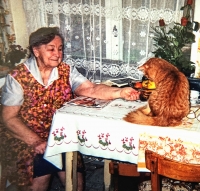We were afraid of them and they were afraid of us

Download image
Milada Mayerová, née Svobodová, was born on 18 June 1920 in Pleše near Jindřichův Hradec. As a young girl she wanted to study but her parents did not allow her to do so. They wanted her to work on the family farm. In 1940 she went to live with her aunt in Stará Boleslav. There she was caught up in the war duty of forced labour. Thanks to her relatives, she did not have to go to Germany, she went to work on a large farm in Úvaly. She stayed there for three years. There she met her future husband Emanuel Mayer, whom she married in early 1945 to avoid deportation to forced labour in Germany. After the war, she and her husband went to his native Lovosice, where the local national committee allocated them a house with a pub. She had to live in the house for several months with three German women who were waiting for deportation. She became friends with one of them. After the currency reform in 1953, Milada’s husband lost all his savings, which until then had guaranteed them a very comfortable and work-free life. Then Milada had to start working as a shop assistant. Her husband was assigned the worst job in the North Bohemian Chemical Works in Lovosice, where he couldn´t be paid more than the lowest wage. It was the punishment for his “bourgeois” origin and his critical attitude towards the communists. In 2021 Milada was living in his apartment in Lovosice.






